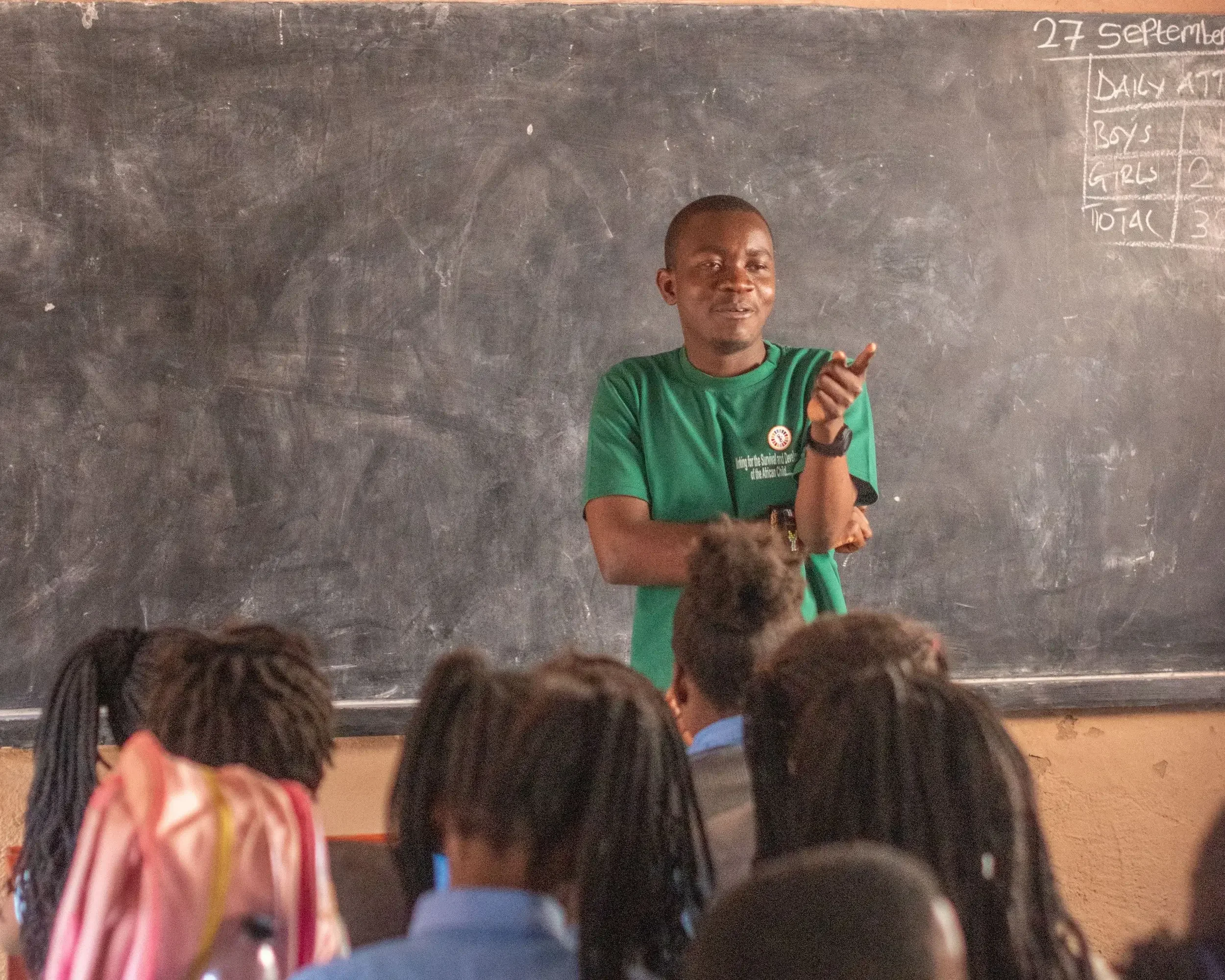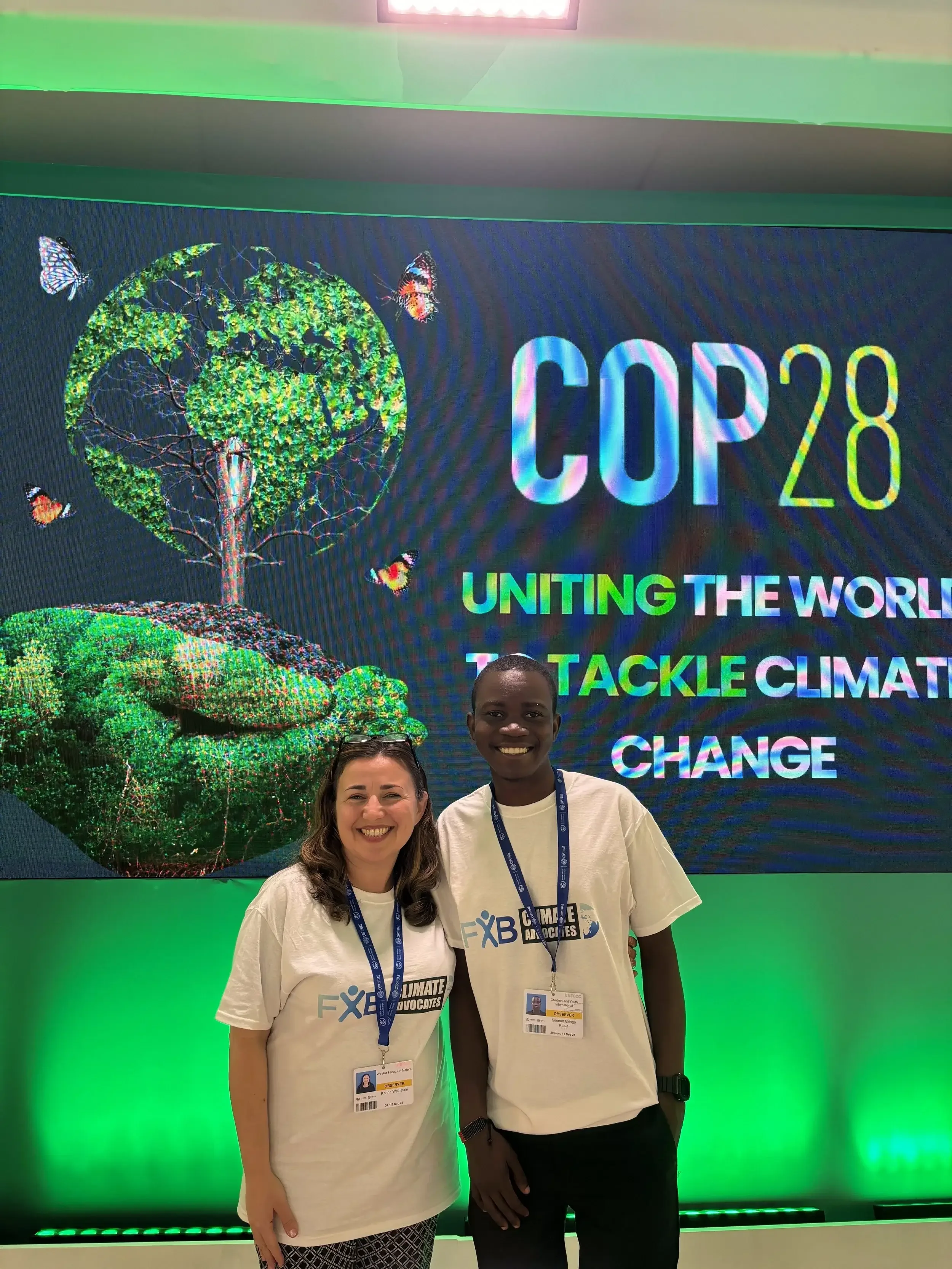Activist Spotlight: Simeon Kalua
An interview with Simeon Kalua — a Malawian climate justice activist and permaculturalist passionate about healing human and planetary health.
Simeon Kalua is a climate justice activist and permaculturist from Malawi. Simeon has experienced firsthand the effects of climate change on his community. This includes prolonged dry spells leading to low harvests and floods caused by Cyclone Ana and Cyclone Freddy. These experiences fueled his ambition to become a climate justice activist.
Since completing his bachelor’s degree in Public Health, he has been on a mission to address the climate crisis at the intersection of people’s health and the health of the planet.
He has founded Green Children, Fridays For Future Malawi, Rise Up Movement Malawi, and Climate Live Malawi. All of these are youth movements with the shared goal of demanding that global leaders immediately act on the pressing issue of climate change. Simeon is also an ACA Ambassador.
We caught up with Simeon to ask him a few questions about his journey and work to address the intersection of human and planetary health.
What first ignited your spirit for justice?
My changemaking journey began in 2021 when I graduated from university. I was studying a Bachelor of Science in public health. In my final year, we did a course called ‘Public Health and Climate Change’.
I had never heard the term “climate” in primary and secondary school. When I was growing up, this meant that even if I witnessed natural disasters, I did not realise they were due to climate change. For example, my father is a smallholder farmer, so even when I’d witness floods and the failure of crops, I would just think it was a bad weather day. So, when I learnt about climate change, my eyes were opened.
This course showed me the impacts of climate change on human health. For example, they taught us about how, when flooding occurs, waterborne diseases spread. Once I learnt about these impacts, I started researching the topic more deeply. I did courses and started following people like Greta Thunberg and Vanessa Nakate.
The more I researched, the more I realised that the biggest contributors to climate change are companies in the Global North. But I wanted to find out about what Africans and Malawians were doing about this problem.
That’s when my climate changemaking journey began, because I wanted more African people to be aware of what climate change is and how it’s affecting them.
How do you see climate injustice playing out in Malawi?
Flooding is one of the biggest climate impacts in Malawi. But there are not enough finances to support those communities affected by flooding.
Another injustice is that young people are not being included in decision-making processes, and yet we need an intergenerational approach to solve these issues. Including youth is a part of climate justice. We know best how the climate crisis is affecting us, what projects we are working on, and how this affects our futures.
You are the founder of the Green Children. What is Green Children all about?
I founded the Green Children organisation last year, in July 2024. It is a youth-led organisation that aims to educate and inspire learners in primary schools on issues of environmental conservation and environmental awareness.
As I’ve said, I only learnt about climate change in university. But I believe people should learn about this from a much younger age so that they can have the spirit of stewardship while they’re still young.
They should know about how important the environment is, what climate change is, and how they can contribute to safeguarding it. I believe that educating children from a young age will allow them to achieve great things. My journey has been inspired by so many young people. For example, Greta Thunberg was very young when she started the Fridays for Future movement.
When these children grow up, they become our future leaders. When they get there, we need them to be mindful of the environment in the businesses they start, the jobs they choose, and the initiatives they pursue, because the environment is the one that gives us life.
What are the connections between community health and climate action?
When I look into community health, I look into quality water, good food that provides nutrition to the people, social health, and whether people are happy. All of these are determinants of health when I look into community health.
When I look into climate action, I look into the things that we are doing to mitigate and adapt to climate change, such as tree planting, sustainable farming.
Community health and climate action rely on each other. For example, if we plant a fruit tree forest, that is a climate action because it removes carbon dioxide from the atmosphere. At the same time, those trees have fruit that people will eat, and it’s good for their health.
Plus, when we farm using organic or sustainable methods, this is good for the climate, but also for our health.
Another example is that when people encourage us to walk over using cars, this is a climate action because it limits pollution and our reliance on fuel. But, this also promotes physical activity and exercise that helps lessen the chances of lifestyle-based diseases.
Why do you believe that permaculture is an important Afrocentric climate solution?
I first learned about permaculture when I was volunteering in my home district with an organisation called Greenspark. They taught me that permaculture is all about working with the environment when you are farming.
For example, if you go into a forest, you’ll see that they survive because the trees support each other. When leaves fall to the ground, they nourish the soil and allow the trees to continue growing. Some vines grow because they have trees to climb on and grasses that cover the soil so that less water is lost. The person who first came up with the idea of permaculture wanted to figure out how we could similarly build a food system by working with the environment. That’s why “food forest” is also a term in permaculture.
In Malawi, we rely heavily on agriculture, but there are a lot of problems. We focus too heavily on maize instead of diversifying our crops. But maize has not done well this year, so we are food insecure. We need to shift toward growing different kinds of crops.
Permaculture also doesn’t rely on toxic chemicals for pesticides and fertilisers. For example, we use companion planting to keep pests away.
I have a small garden at home, where I plant different crops and practice permaculture. People ask me about my garden and how I do certain things. In that way, I spread the permaculture knowledge to them.
What inspired you to start your Substack newsletter? And what can people expect from you on that platform?
When a friend of mine, Emma, visited me in Malawi from Ireland, she convinced me to start my Substack as an extension of my advocacy. It’s called “Malawi’s Call” and the aim of it was to reach an audience in the Global North so that they know how the climate crisis is affecting Africa. I am calling on leaders in the Global North to take action and acknowledge the fact that we experience the worst consequences of the problems they have created.
I share stories of how climate change is impacting Malawi and plan to feature interviews with other changemakers and activists who are leading the way.
What has been the biggest highlight of your climate action journey so far?
The first one is attending COP28 in Dubai. I was selected as one of the International Youth Climate Delegates Programme by the COP28 Presidency through the Climate Change Young Champion. Attending this conference gave me insight into how people negotiate and make decisions. I also got to meet a lot of other young people who are fighting for climate justice.
Another highlight was the research I did during my Solidarity Exchange for the Environment and Development Programme, which allowed me to go to Norway for five months. We conducted research in Malawi by speaking to farmers here to understand how they have been affected by Cyclone Freddy and how climate change is affecting agriculture in Malawi. Once we had completed the research, we presented it in Norway at an event where we met with people from many different countries who were all spreading awareness about the impacts of climate change.
In Malawi, we have visited different cities, schools, and organisations where we shared our research on the impacts of climate change on agriculture. That was a huge highlight for me.
When you travel to other countries, what is the key message that you want global leaders to understand about the climate crisis on the continent?
What I always take with me are the messages that show how climate change is impacting our countries through destruction, loss, and damage. I tell them that this is what is happening, and we don’t have the funds to rebuild and recover from this. So, we need urgent climate action. We need you to shift away from burning fossil fuels and to choose sustainable energy.




